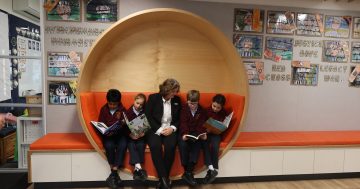
NAPLAN is in the news again, with criticisms flying around the quality of the testing and what it is really telling us about how our kids are doing in school. For us parents, it is pretty hard to know what to think. It is very hard to understand how the introduction of this universal testing system has influenced teaching in our schools, or what it actually means for our kids’ learning experience.
As is the case with any approach, there are positives and negatives. Here in the ACT, analysis of our schools’ performance in NAPLAN has certainly raised some key concerns. Another emerging issue is that this test has been the total focus of how our schools, teachers and kids are performing, when there are many other factors at play. This is a problem, particularly when we realise that with NAPLAN we are really looking at the rear-view mirror, without much discussion of ways that we can better support our kids and their teachers in schools now and into the future.
Independent of what we think about NAPLAN, surely there is a need to talk about the other ways we should be supporting teachers, schools and the whole system to enable all our kids to get the most out of their education experience. We owe it to them, given this gift is one of the key things that will influence their future – from the next step of their education, the job they get, the income they earn, the options they have access to, the satisfaction they draw from life, and their ongoing health and well-being.
We know that the quality of the teaching that occurs in the classroom is the most influential in-school factor that determines a child’s on a child’s learning, but we generally send teachers into the classroom with little ongoing support and feedback. While there is investment in professional development and ongoing learning, this is not necessarily linked to a teacher’s individual needs. A key question is: are there new tools being developed, or other investments we could be making to support this in-class experience – for both students and teachers?
It turns out there are. In 2013 the Bill and Melinda Gates Foundation released the results of a three-year project which sought to identify the key tools to improve teacher effectiveness. They found that along with actual student performance and in-class observation, student surveys were a key tool that could be used to provide feedback and improve effectiveness. This confirmed earlier research undertaken by Professor John Hattie which recognised the importance of feedback in improving teaching practice. Interesting, Finland and Singapore – which are both top-performing nations in international standardised tests of student learning, such as those used by the OECD – are some of the biggest users of student surveys to support teacher professional development
There may be sceptics around the idea that students’ views could be helpful, but the research found that asking what students perceptions of their classroom environment provides important information about a teacher’s teaching effectiveness. Student feedback can offer unique and complementary insights that can help teachers improve. Rather than relying on a tool such as NAPLAN that is school-based and historical, this student survey approach focuses on in-class practice (which we know makes the biggest difference), places the student at the center, provides specific feedback for teachers to reflect on in relation to their practice.
Schools are starting to get on board with this approach. A number of schools in the ACT are trialing a new generation of student survey tools that are based on international experience and statistically validated, following Victoria’s lead who has already piloted this approach in their government schools. Rather than leaving it to individual teachers to write their own questions and seek feedback on their own, this provides a way to save time, resource and provide an evidence-based approach the quality of the information they receive.
I hope that we can move beyond seeing NAPLAN as the only answer in relation to improving student performance and instead see more of ACT’s schools being supported access these types of programs. What do you think?




















